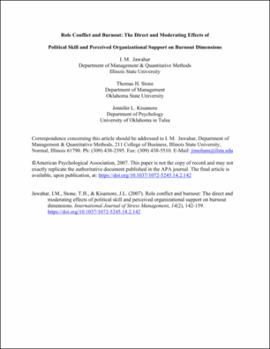| dc.contributor.author | Jawahar, I.M. | |
| dc.contributor.author | Stone, Thomas H. | |
| dc.contributor.author | Kisamore, Jennifer L. | |
| dc.date.accessioned | 2022-04-29T17:21:06Z | |
| dc.date.available | 2022-04-29T17:21:06Z | |
| dc.date.issued | 2007 | |
| dc.identifier.citation | Jawahar, I. M., Stone, T. H., & Kisamore, J. L. (2007). Role conflict and burnout: The direct and moderating effects of political skill and perceived organizational support on burnout dimensions. International Journal of Stress Management, 14(2), 142–159. https://doi.org/10.1037/1072-5245.14.2.142 | en_US |
| dc.identifier.uri | https://hdl.handle.net/11244/335391 | |
| dc.description | ©American Psychological Association, 2007. This paper is not the copy of record and may not exactly replicate the authoritative document published in the APA journal. The final article is available, upon publication, at: https://doi.org/10.1037/1072-5245.14.2.142 | en_US |
| dc.description.abstract | Drawing from previous research on the effect of role conflict on burnout and the Conservation of Resources theory, we propose that individual differences in political skill and perceptions of organizational support will be negatively related to burnout and will also moderate the relationship between perceived role conflict and burnout. In a sample of 120 professional employees, political skill was associated with less depersonalization and feelings of reduced personal accomplishment and moderated the role conflict-reduced personal accomplishment relationship. Perceived organizational support was associated with less emotional exhaustion and depersonalization, and moderated the role conflict-emotional exhaustion relationship. Implications of results are discussed and directions for future research are offered. | en_US |
| dc.language | en_US | en_US |
| dc.subject | Role conflict | en_US |
| dc.subject | Burnout | en_US |
| dc.subject | Political skill | en_US |
| dc.subject | Perceived organizational support | en_US |
| dc.subject | Conservation of resources model | en_US |
| dc.title | Role conflict and burnout: The direct and moderating effects of political skill and perceived organizational support on burnout dimensions | en_US |
| dc.type | Article | en_US |
| dc.description.peerreview | Yes | en_US |
| dc.identifier.doi | https://doi.org/10.1037/1072-5245.14.2.142 | en_US |
| ou.group | Dodge Family College of Arts and Sciences::Department of Psychology | en_US |
